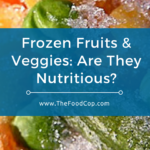Frozen Fruits & Veggies: Are They Nutritious?
During the winter months when fresh produce is not widely available, many people opt to purchase frozen fruits and vegetables to help meet their daily requirements. Are the frozen varieties as nutritious as the fresh varieties though?
Because frozen fruits and vegetables are normally processed within hours of being harvested, their vitamins and minerals are able to be preserved. Note that raw produce can sometimes spend several days in transit or in storage prior to them being consumed, losing important nutrients during this time.
Frozen fruits and vegetables have other additional benefits as well:
- Value – They not only have a much longer shelf-life than refrigerated foods, but they can be portioned and stored for later use, which in turn reduces spoilage and food waste.
- Convenience – They come pre-cut, washed, and ready to cook or eat, making it easy to toss in with other dishes to provide more taste, color, and added nutrients to your meals.
Remember these tips when shopping for frozen fruits and vegetables:
- Frozen fruits are available in sweetened and unsweetened varieties, so be sure to check the nutrition label before purchasing. Choose the unsweetened variety if you are watching your sugar intake.
- To manage fat and calories, choose frozen vegetables in the plain variety or those made with low-fat sauces.



Pingback:Eating Healthy on a Budget | The Food Cop - Clean Healthy Eating
Pingback:Make a Healthy Meal in Less Than 15 Minutes | The Food Cop - Clean Healthy Eating